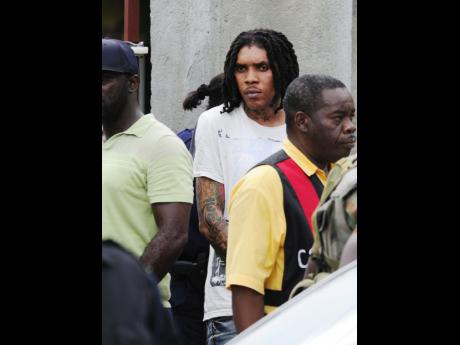Kartel back on stage - Murder convict's appeal gets under way today
Lawyers for popular entertainer Vybz Kartel are contending that the judge who presided over his murder trial erred when he allowed prosecutors to use text messages and video evidence collected from his cell phone.
The assertions are among 16 grounds filed by Kartel's attorneys, Valerie Neita Robertson and Tom Tavares-Finson, to convince the Court of Appeal to quash his murder conviction.
The attorneys argued that the evidence had demonstrated that these had been compromised and contaminated to such an extent that there was more than a reasonable doubt about their integrity as evidence.
Kartel, real name Adidja Palmer, was convicted in April 2014, along with fellow entertainer Shawn Storm, real name Shawn Campbell, as well as Kahira Jones and Andre St John, for killing Clive 'Lizard' Williams in 2011.
LIFE SENTENCE
They were all given the mandatory sentence of life in prison, with Kartel ordered to serve 35 years before being eligible for parole, while Campbell, Jones, and St John were ordered to serve 25 years before being eligible for parole.
The Appeal Court is to begin hearing their case today.
The 65-day trial, which captured national attention, featured video, text, and audio messages, which police investigators claim were taken from Kartel's BlackBerry cell phone.
But Kartel's attorneys, in their appeal, pointed to evidence presented during the trial that one of the phones was used several times while it was in the custody of police investigators.
They charged, too, that "the evidence of tampering was uncontroverted and unexplained."
Kartel's attorneys argue that given the importance of the cell phones to the case against the entertainer, prosecutors had a duty "to show that integrity of the electronic device was uncompromised".
Justice Lennox Campbell, who presided over the trial, was also faulted for allowing video evidence from the phone to be used as evidence. According to the attorneys, the video evidence was "highly prejudicial and of little, if any, probative value".
"By doing so, he invited the jury to speculate about contents of the video and any possible linkages to the appellants, thereby compounding the prejudice and denying them a fair trial," they argued.
Paula Llewellyn, director of public prosecutions, had no comment for this story. She, however, confirmed that a three-man team, led by Senior Deputy Director of Public Prosecutions Jeremy Taylor, will oppose the appeal.

